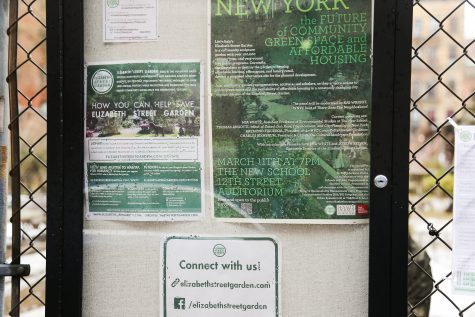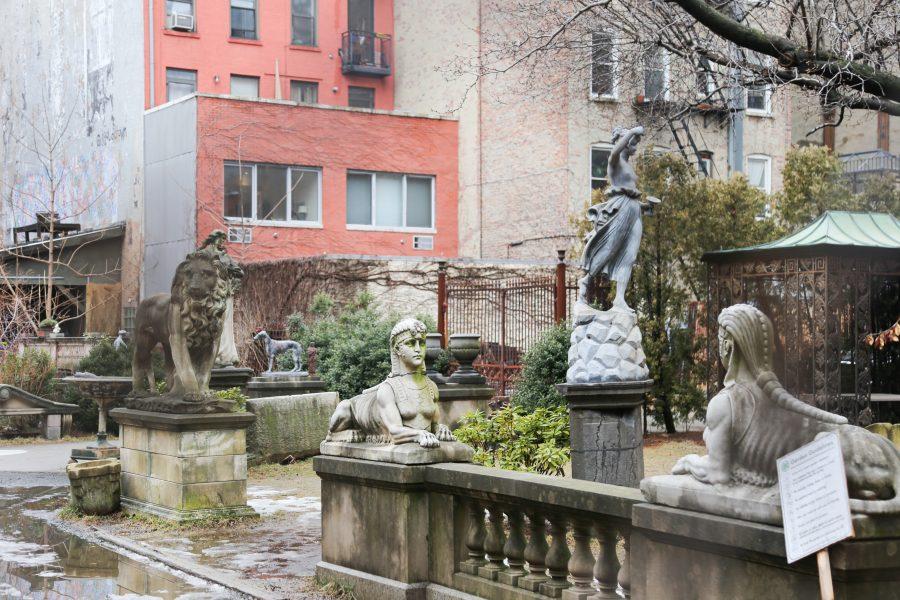There’s a small open space in Little Italy nestled among the buildings of Nolita. It’s filled with statues, benches, greenery and, weather permitting, New Yorkers basking in the sun. This is the Elizabeth Street Garden. As of right now, it’s also the future location of an affordable housing complex for seniors.
The garden first came to fruition in 1990, when the Elizabeth Street Gallery owner Allan Reiver started leasing the lot from the city on a monthly basis. Reiver cleaned up the trash-ridden lot, fenced it, planted greenery and placed some statues from his gallery. In 2005, he granted the public access to the garden through his gallery, and in 2013, access from the street.
In 2012, the city announced its intentions to build affordable housing on the site and members of the community began rallying to keep the garden open.
The apartment complex, named Haven Green, will be seven stories tall and provide 123 affordable studios for seniors, as well as retail space and office space for Habitat for Humanity NYC, one of the developers of the project. It will also be an LGBTQ-friendly development, with plans to offer support services for seniors in that demographic.
Two groups that support the garden filed lawsuits against the city this week demanding that the city provide an environmental impact statement on the garden’s land before the development can continue. This would provide more in-depth analysis compared to the environmental assessment statement New York City released in November.
On Feb. 26, Manhattan Borough President Gale Brewer approved a recommendation to go through with the development of the project, with the condition that the developers attempt to increase the open space in the development plans by 30 percent.
As of now, the developers have plans to create about 6,700 square feet of publicly-accessible open space as compared to the roughly 20,000 square feet currently available. JR, the garden’s executive director and Allan’s son, said the proposal isn’t much of a compromise.
“They would destroy all of [the garden],” Reiver said. “They would build their own space and the space would be drastically different.”

Tandon junior and Lafayette Street Residence Hall resident Tarek Hassoun discovered the garden at the beginning of this semester but has since returned many times. During their first visit, they struck up a conversation with another visitor, who told Hassoun about the plans to develop Haven Green. Although Hassoun enjoys going to the garden to seek refuge from the city, they believe that it comes down to the city’s priorities.
“I’m more so leaning towards the fact that senior citizens need affordable housing,” Hassoun said. “While we can search for alternatives, there are tons of seniors on the waitlist right now.”
Haven Green said it would provide affordable housing for the next 60 years, despite Brewer’s recommendation that stipulated the housing be made permanently affordable.
Those who wish to keep the garden open have argued that a lot at 338 Hudson Street would actually provide more space for the development and allow the garden to stay.
A statement from Haven Green posted on their website in November says that the lot on Hudson Street is not a viable alternative as it is controlled by the Department of Environmental Protection and contains an important water shaft that cannot be built on.
“Haven Green is not pitting affordable housing against green space; the reality is that the project offers both to a neighborhood where both are so desperately needed,” the statement reads.
Vice President of External Affairs for Habitat for Humanity NYC Matthew Dunbar said the organization understands the sense of community that surrounds the garden. He said that it should also be recognized that building Haven Green would do good for the community.
“The fact of the matter is when something could be lost, there is oftentimes a lot more energy and a much more vocal opposition to losing something then there is to potentially gaining something,” Dunbar said.
Reiver says that while he believes there is a need to push more affordable housing and supports the cause, he doesn’t believe it should be at the expense of the garden.
“One, it’s vital in the sense of that’s green space — real green space, not paved park. And two, it’s this sense of community,” Reiver said.
Reiver will speak at a panel about community green spaces and affordable housing on March 11.
The City Planning Commission will hold a public hearing on Haven Green on March 13, before it goes to the city council for a vote.
A version of this article appeared in the Monday, March 11, 2019, print edition. Email Bethany Allard at [email protected].























































































































































